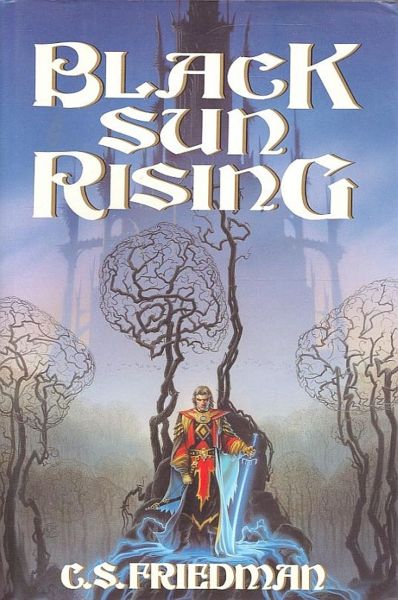A Friend in Me
Black Sun Rising (Coldfire, volume 1)
By C. S. Friedman

4 May, 2021
C. S. Friedman’s 1991 Black Sun Rising is the first volume of her Coldfire trilogy.
The Terrans who discovered Erna initially deferred settlement due to concerns about the planet’s seismic activity. Ultimately, the world was too promising not to colonize, a decision to which their descendants might well object. The incessant quakes are annoying … but they’re not the biggest problem. What is? The Fae.
The eldritch force called the Fae transforms human will into tangible consequence. The result is indistinguishable from magic. If that were not challenge enough, simple human expectations alter the world around them. Consequently, science and technology, reliable elsewhere, aren’t reliable on Erna.
Centuries after settlement, visionaries like Damien Vryce, priest of the Church of Human Unification, are still trying to come to terms with the implications of the Fae. Damien is not all work, however. He is courting Adept Ciani, which is why he is very upset when she is killed and her shop is levelled in a Fae-related mishap.
Matters are not as they seem. They are much worse.
Her assistant Zen destroyed the shop for reasons that no doubt made sense to him at the time (your humble reviewer was a bit unclear on the logic). He was attempting to conceal Ciani’s true state from those who knew her. Ciani isalive but she might prefer not to be. She has been attacked by supernatural Soul Eaters. She is spiritually injured, stripped of important memories, all her talents, and the will to live.
If Ciani’s attackers could be tracked down, her memories and magic could be restored — perhaps. To this end, Zen, Damien, and Ciani set out in search of the entities at fault. The trail leads the party towards regions humans avoid, localities for which phrases like “evil forests” could have been coined.
The party is joined for reasons unclear by Gerald Tarrant, who claims to serve the Hunter, a powerful adept of dubious reputation. Trusting Tarrant is a gamble, but the party needs strength in numbers. Mistrust is wise: Tarrant does not serve the Hunter. He is the Hunter — former Prophet of the Church for Human Unification and quite possibly history’s greatest monster — and the compulsions that are the price of his power make him a chancy ally. Despite this, Ciani, Damien, and Zen seem to be stuck with him.
Among the complications created by the Fae: local lifeforms have been transformed from bright catlike animals into human-level intelligent Rakh. Rakh did not ask to be willed into existence by human fears and they bear humanity a grudge for shaping them. The Soul Eaters are headed towards their owner, the Keeper of Souls, on a path leading through Rakhlands, which means the party will have to find a way to negotiate with beings who loath most humans.
Even if the group can somehow find common cause with the indigenes, this may not be enough to save them from the Keeper of Souls.…
~oOo~
Friedman gets a lot of milage out of magic being largely incomprehensible. Characters in the service of Fae do things that just don’t make sense, but that’s OK. These aren’t the reasons you’re looking for. It’s not just the Rakh; humans are just as vulnerable to alteration and compulsion as any native species. So far, they haven’t come up with any effective coping mechanisms, which may explain why the rest of star-faring humanity seems to be avoiding Erna [1]
Thanks to the Fae, the pace of change can be very, very fast. Macroscopic fauna evolve as quickly as bacteria in our world develop resistance to antibiotics. The fauna are shaped (among other things) by human hopes and fears. Human existence on Erna is precarious, as is that of the Rakh.
The Rakh have good reason to resent having been unwillingly and haphazardly uplifted by irresponsible shapers (such as good old Victor Frankenstein, who simply abandoned his creation).
Although there is an SFnal explanation for the magic in this book, an explanation every bit as rigorous as the explanations in Garrett’s Lord Darcy stories or Stasheff’s the Warlock in Spite of Himself novels, Black Sun Rising feels more like high fantasy than it does science fiction. Part of this is the setting, part are the operatic conflicts and the grand villains brooding in their isolated strongholds. (The only structure better suited to high fantasy than some ancient castle is a sturdy fortification somewhere dank and cursed, preferably surrounded by monsters.)
The prose in this novel sounded more like fantasy to me. Friedman’s language is ornate, embellished. Also reminiscent of a lot of fantasy: the hefty page count (almost six hundred pages in some editions) and a plethora of major plot-hooks promising More to Come (in the next two volumes, which the author hopes the reader will buy). I note that not only is this one of those trilogies comprising three (count them! three!) books, all three books were delivered promptly and reliably. A lesson that might well be instructive to some other authors (ahem).
Black Sun Risingis available here (Amazon US), here (Amazon Canada), here (Amazon UK), here (Barnes & Noble), here (Book Depository), and here (Chapters-Indigo).
1: Or perhaps star travel is hard and contact is rare for everyone.
